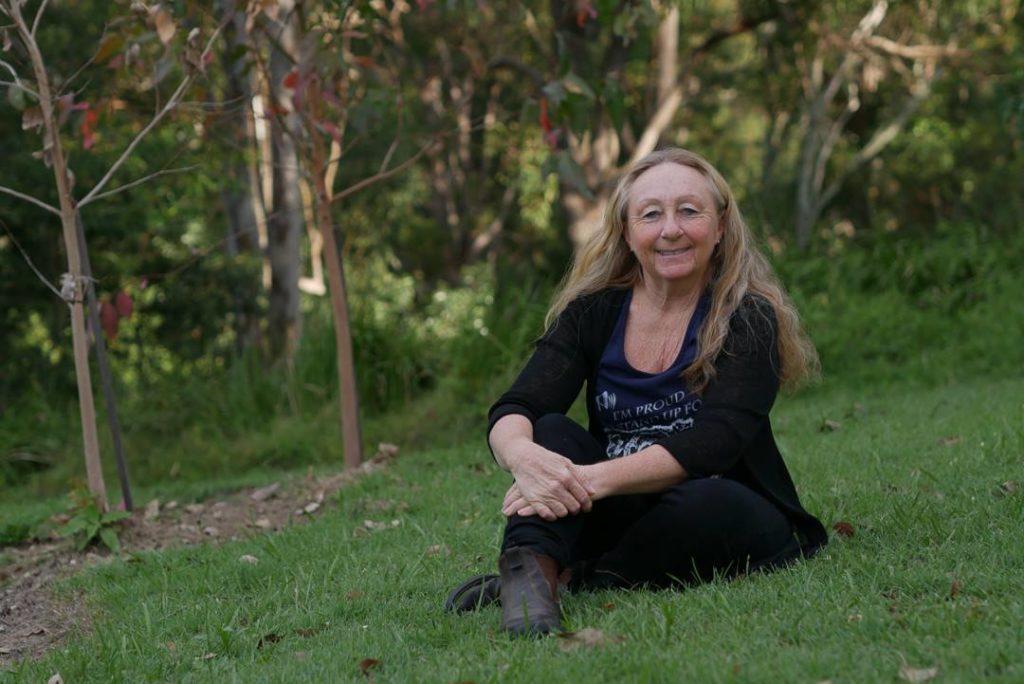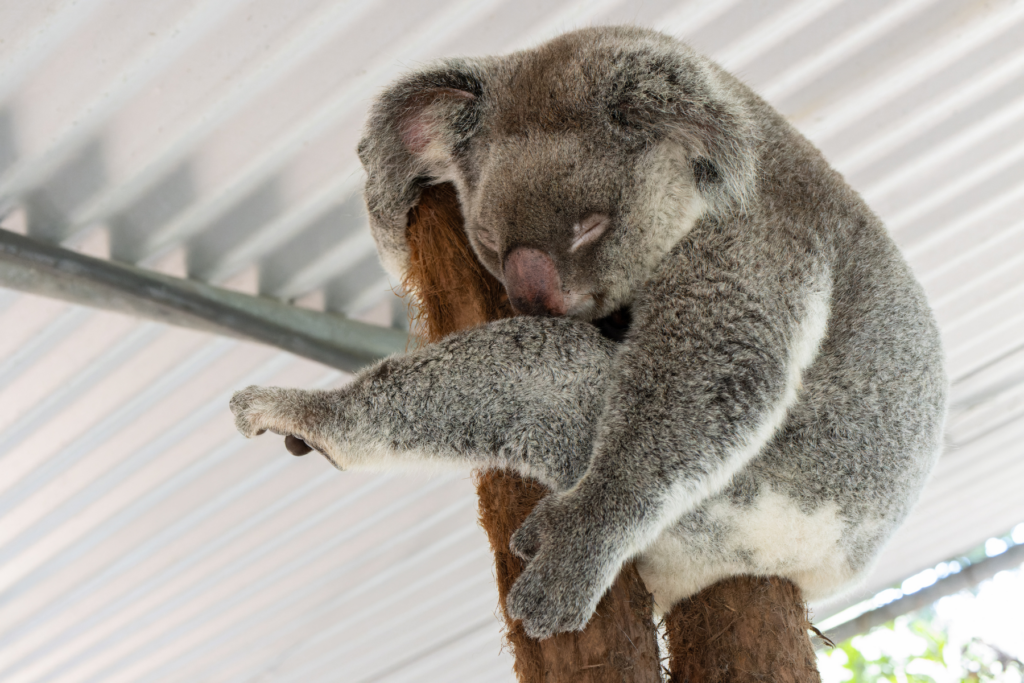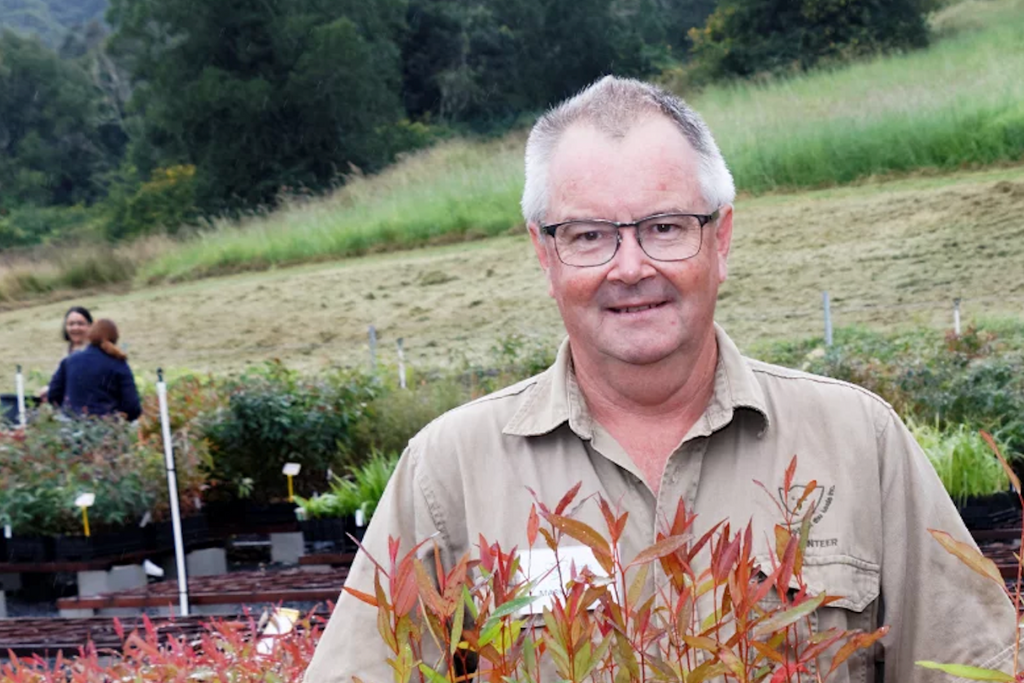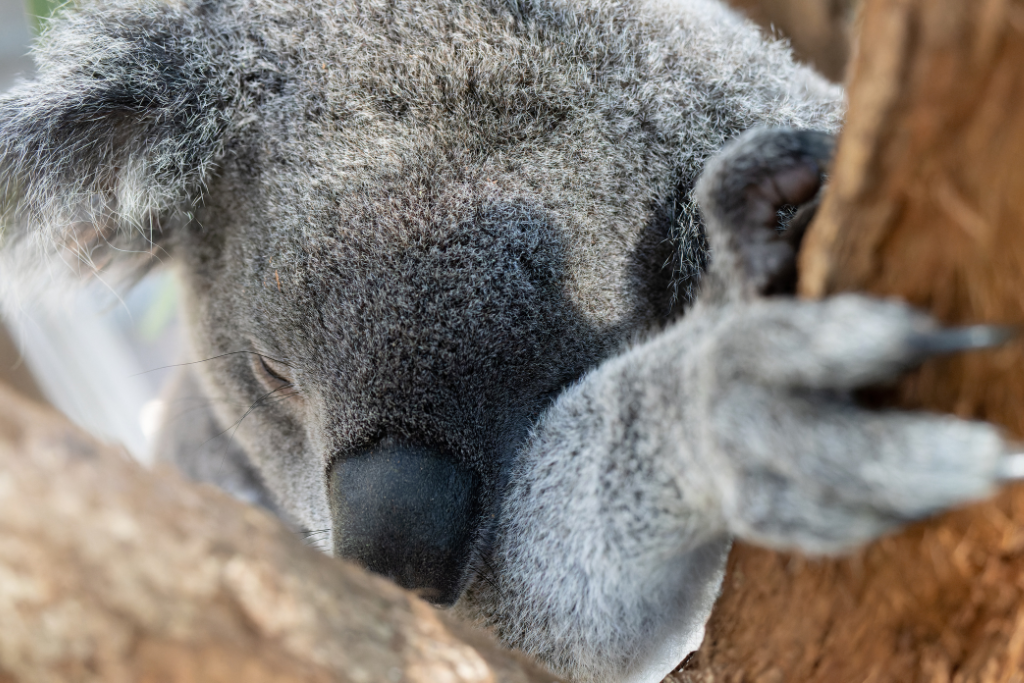Friends of the Koala Data Coordinator, Katrina Jeffery has her own private property known as Koala Gardens which is under a conservation agreement and includes a plantation of trees to feed the koalas in care, a soft release facility and a kindy/physiotherapy enclosure containing 50 trees for koala rehabilitation.
What is your background?
I grew up in Brisbane, and my earliest memories involve a fascination with nature and animal behaviour. My biggest childhood hero was Jane Goodall, and I dreamed of a life that would allow me to make a difference for wild animals.
My life took many twists and turns to get to where I am today, after I studied Veterinary Nursing and Zookeeping in Sydney in the late 1970’s. I moved to the Northern Rivers in the early 80’s and soon found myself on small acreage near Kyogle, raising my children and supplying raw goats’ milk all around the area for many years. I used organic practices and was one of the early properties in the area to successfully use the Maremma Sheepdog to protect my herd from wild predation.
During this time, I studied some computer database programming and as my children became less dependent, I developed my own business, creating database applications for small businesses in the area and teaching some IT and Business subjects with the local community colleges.
In 2010 my husband and I bought our dream property at Tuckurimba and even though he loved slashing areas of the property, we planted 1000 koala habitat trees in the first 3 years until he was diagnosed with MND. After his tragic death in early 2014, I finally walked over the property to see what had happened there during his illness and found to my amazement that 2000 koala food trees had self-sown from the mature indigenous trees.
What is your FOK story? When did you join and why?
The discovery of these self-sown trees began a life-changing path for me, and I joined FOK to learn more about koalas, and was successful in gaining project funding to start fully regenerating the property for koalas and the other natives that share their ecosystem.
I began volunteering on care shifts and found myself learning so much about koalas, their behaviour, their challenges and needs, and why their declining habitat is so critical. I was hooked!
What roles have you been in during your time at FOK?
I found learning to care for koalas easy because of my extensive clinical and husbandry background and was soon doing clinical work and by 2016 was a shift supervisor.
I moved into committee work and became Treasurer at a critical time when FOK was transitioning through huge growth from a purely Volunteer Organisation to an employer. In this role I converted our entire financial system to an updated online system, registered us for GST reporting and setup our first Payroll system. We built the Burribi our Education and Administration Centre and hired our first staff member.
In 2017 we began planting the food tree plantation here that we harvest from most weeks, year-round, to feed the koalas that are in care in the hospital.
Due to some changes in my work situation, I scaled back to care shifts only. However, it didn’t take too long before I began assisting with converting our data collection system into an integrated system that could be shared.
In 2019 I was invited to assist some scientists in Sydney that were studying the koala response to rehabilitation, by doing some work I had long wanted to do – standardise the data that had been collected in some inconsistent ways over the past 30 years.
At this point I stepped back from the care shifts so that I could concentrate on this project which took many hundreds of hours over 18 months.
We established the Soft Release facility and the kindy enclosure on my property so that recovering koalas can be fully assessed for their readiness for release to the wild. We often conduct periods of physiotherapy and observation here for koalas that have had serious injuries and long hospital stays.
What has been your biggest achievement/special memory during your time volunteering?
I would list my work on standardising the database as my biggest achievement, because our data is used in so many ways, every single day, to help koalas by informing us of just what is happening with them. This can be used to oppose DA proposals in sensitive areas, inform tree planting projects, setup road signs, fencing and speed zones where koalas are active and make decisions on educational programs throughout the region.
We have the largest dataset for koalas in the world, going back for the longest time period and that is a huge achievement.
My most special memory is around a koala that lives on my own property named Bullet. He was a regular in the colony here and was bitten by a dog somewhere in the area. I was able to capture him with a trap and he spent nearly 2 months in care. My special memory is of being able to release him here again – choosing the tree, bringing him home, and seeing him leap from the cage into one of his own trees will stay with me forever.
He still lives here, having made a full recovery, and is a constant reminder to me that every koala counts. We cannot give up on these beautiful creatures, not ever.
How has volunteering impacted you?
I have always given back to my community through voluntary work, but FOK was the first wild animal related organisation I have been with. The sheer number of volunteers, and the breadth of activities this organisation undertakes is almost dizzying. I have a deep desire to leave this world a little better than I found it and being a part of FOK helps me feel I am doing just that.




